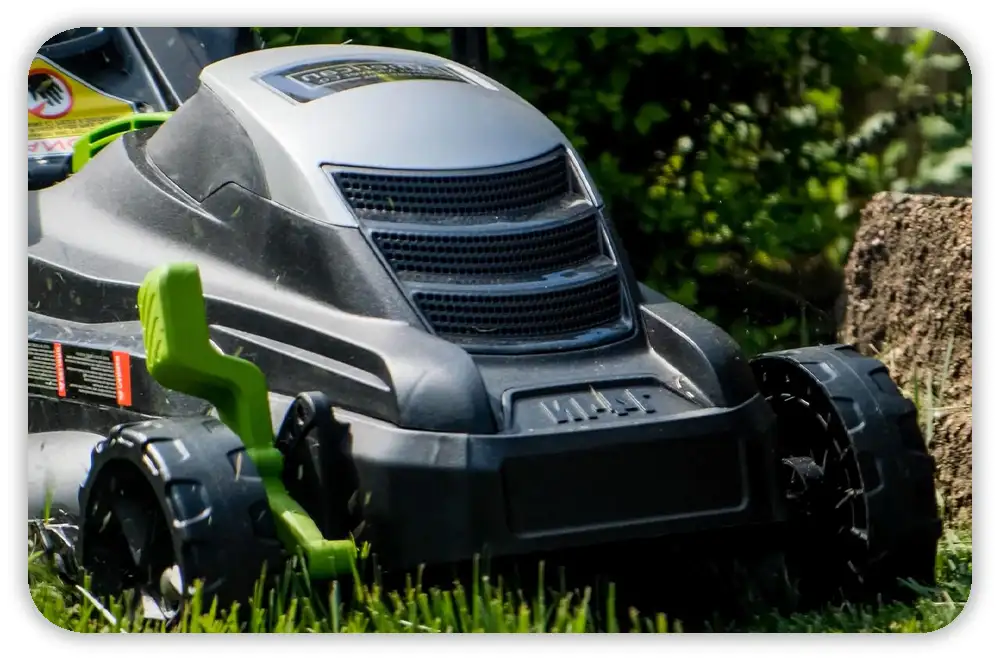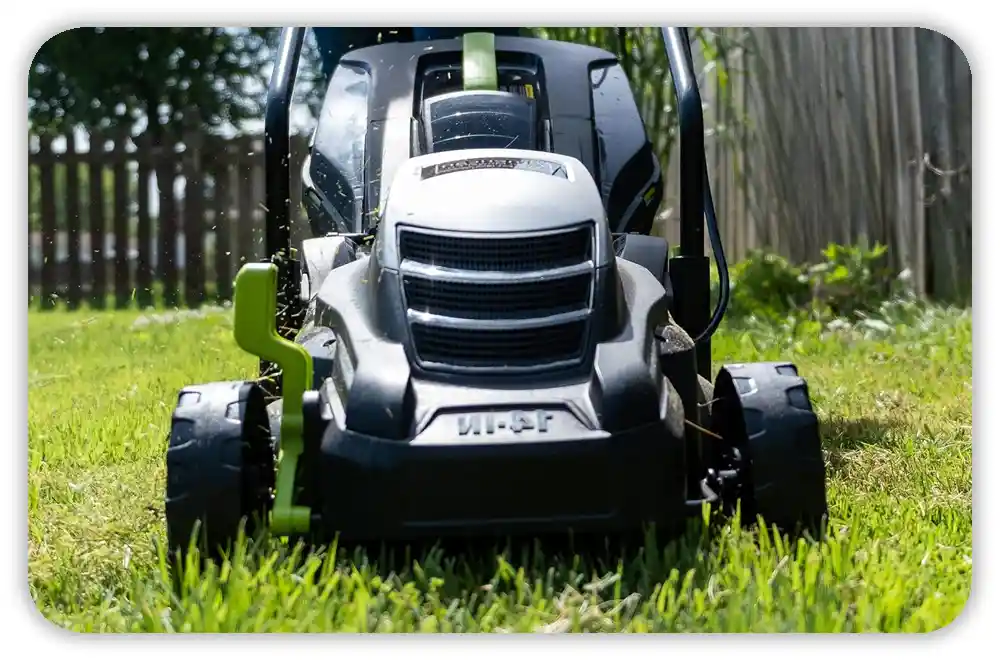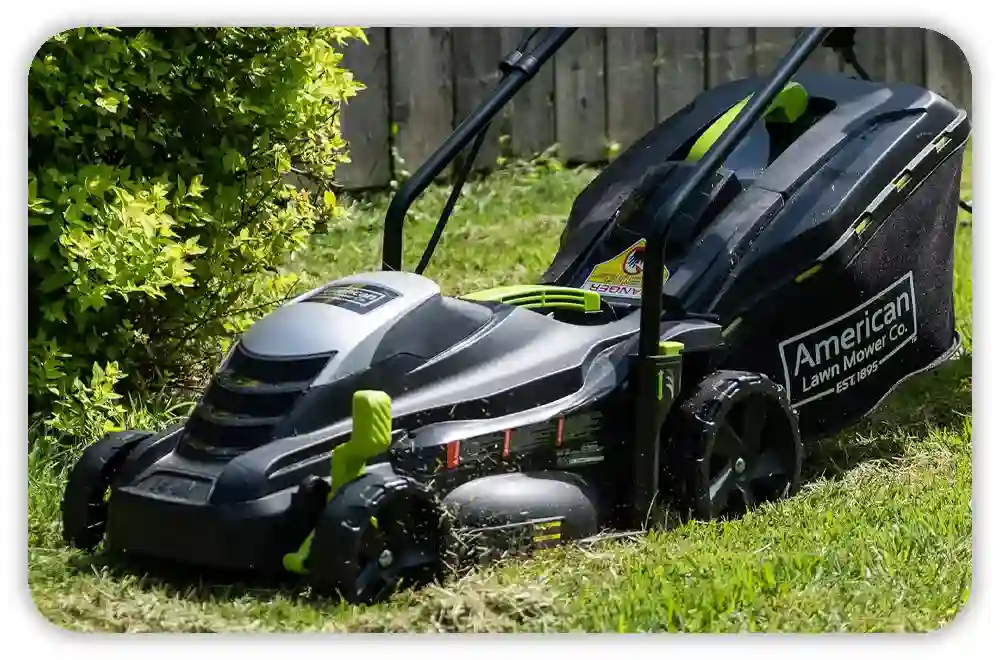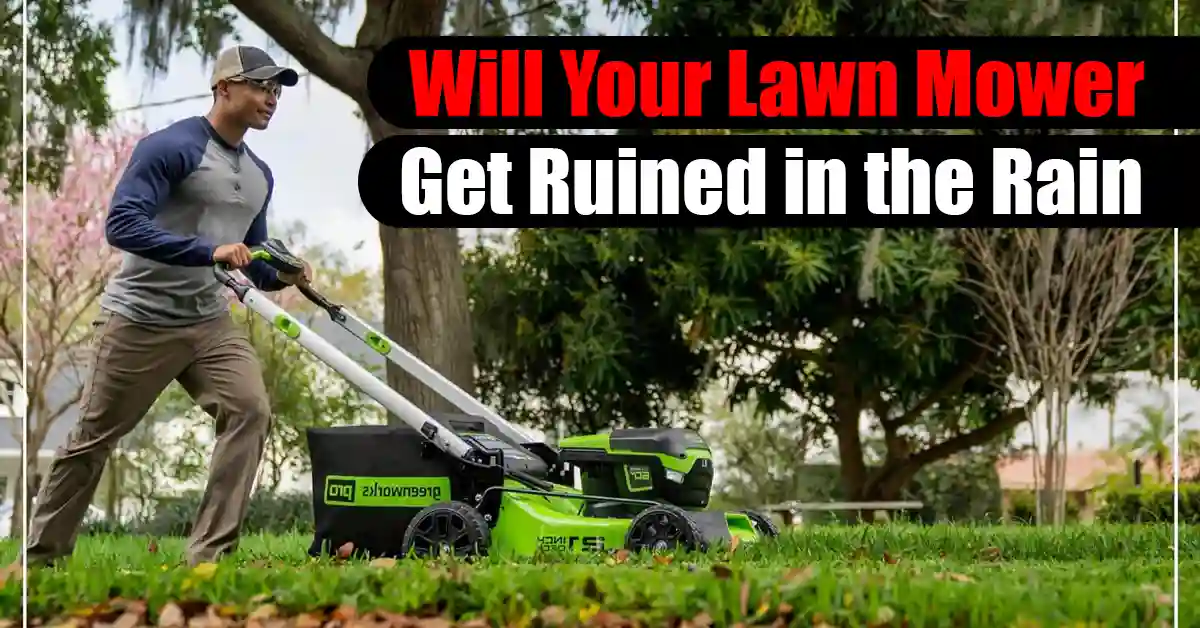You’re not the only one who’s left a mower out in the rain. And yes, you might wonder—will rain ruin your lawn mower?
The short answer: not always, but it can.
If water gets into the fuel, oil, or wires, your mower could be in trouble.
I’ve had one mower start fine after a light drizzle. But another wouldn’t even turn on after a big storm.
The truth is—some parts can handle water, while others can’t.
Knowing what’s at risk can save you money later.
Stick around. I’ll walk you through what happens when a mower gets wet—and how to protect it next time.
Table of Contents
Can Rain Really Ruin a Lawn Mower?
Let’s clear this up—most mowers are water-resistant, not waterproof.
That means they can handle damp grass or a light sprinkle. But they’re not built to sit in heavy rain or get soaked over and over.
Water-resistant just means the outside can shed a little water. But rain can still sneak inside—into the gas tank, wires, or engine.
And when that happens, problems start. I once left my mower out during a surprise storm. It looked fine the next day.
But a few weeks later, the throttle cable started to stick. By fall, the deck was rusting through.
So, even if it seems okay at first, rain can cause slow damage.
If you live in a place like the Midwest or Southeast, storms can show up fast. One wet night may not break your mower. But if it keeps happening, it can do real harm.
What Happens When a Mower Gets Wet?
Rain can cause damage you might not see right away. Some problems happen fast—like a wet spark plug that stops the engine. Others show up later, as parts rust or wear down.

Internal Damage Risks
Here’s what can go wrong inside:
- Fuel system trouble: Water in the gas tank is a big problem. Since water sinks below gas, your engine might suck up water, not fuel. That can make it stall, sputter, or stop completely.
- Milky oil mix: If water gets into the oil, it turns milky and useless. The engine heats up fast and parts wear out too soon.
- Electric short circuits: If you have a battery or corded mower, water is risky. Even a few drops near the battery or board can short it out. For corded mowers, water means a shock risk too.
Long-Term Wear and Tear
Even if it runs fine now, water can still cause trouble later:
- Rust and corrosion: Wet clippings under the deck can lead to rust. Blades get dull. The metal weakens.
- Stiff or broken cables: Water can slide into the cable covers. The wire inside starts to rust. That can lead to sticky controls—or a cable that snaps.
- Soggy seats (for riding mowers): If your riding mower’s seat gets soaked, the foam inside stays wet. That can lead to mold, smells, and a very damp ride.
Mower Types and How They Handle Rain
Not all mowers handle rain the same. Some can take a little water. Others are much more fragile. Let’s look at how each type holds up when the weather turns wet.
Gas-Powered Mowers
Gas mowers have engines that don’t mix well with water. If water gets into the gas tank, oil, or air intake, the engine may not run.
Here’s what can happen:
- Water in the carburetor can stop the engine.
- Wet spark plugs may keep it from starting.
Quick fixes I’ve used:
- Air filter – If it’s wet, dry it. Replace it if it’s paper.
- Spark plug – Dry it well. If it looks bad, get a new one.
- Fuel system – If there’s water in the gas, drain the tank and carb. Refill with fresh fuel.
I once had to do all this after a summer storm. My mower was soaked overnight, and it didn’t start until I drained the gas and changed the spark plug.
Battery-Powered Mowers
Battery mowers are easy to use—but they don’t like rain.
Water can:
- Get into the battery case
- Rust the terminals
- Damage the motherboard
One time, my battery wouldn’t charge after a stormy night. The contacts had rusted, and the battery was ruined.
What to watch for:
- Rusty terminals
- Flashing error lights
- A swollen battery (this can be dangerous)
Corded Electric Mowers
Corded mowers are the most sensitive to rain—and the most dangerous when wet.
Water and electricity don’t mix. If the cord, motor, or switch gets wet, it can short out or shock you.
I never leave mine outside, even when clouds roll in.
If it gets wet:
- Let it dry for 1–2 days in a warm spot
- Never plug it in while wet
- Check the cord for damage before use
Bottom line: Don’t leave a corded mower outside. Ever.
Robotic Mowers
Some robotic mowers can handle light rain. They often have sensors that send them home when rain starts.
Still, over time, water can sneak into:
- The charging base
- The wheels
- The main controls
Sun and rain can also crack seals and fade parts.
If you live in a stormy area, like the Midwest or Pacific Northwest:
- Clean the wheels often
- Keep the base on flat, dry ground
- Use a rain cover or small garage for extra safety
Some brands even sell special weatherproof covers just for these mowers.
What to Do If Your Lawn Mower Got Wet
So, your mower got caught in the rain? Don’t worry—I’ve been there too. Whether it sat out overnight or got hit by a storm, you can often fix it if you move fast.

Step-by-Step Rescue Checklist
Move it to a dry place: Get it out of the rain right away. A shed or garage works best. If that’s not an option, a covered porch is better than nothing.
Unplug the spark plug or remove the battery: Safety comes first. For gas mowers, unplug the spark wire. For electric ones, take the battery out or unplug the cord.
Wipe off all the water: Use a clean towel. Dry the engine, control panel, and the area under the deck. Get as much water off as you can.
Use air or low heat to dry tight spots: Blow air into vents, switches, and battery areas. If you don’t have an air blower, a hairdryer on low heat works fine.
Check These Key Parts:
- Air filter – Wet? Let it dry or replace it.
- Oil – Milky? That means water—change it.
- Fuel – Think water got in? Drain it and refill with clean gas.
- Battery – Look for rust or swelling. Dry it before putting it back.
Try starting the mower: Once everything feels dry, reconnect and start it. If it doesn’t start, wait another day and try again.
Warning: If you hear odd sounds or smell burning, stop. That may mean there’s deeper damage.
How to Prevent Rain Damage to Your Mower
If your mower has ever been left out in a storm, you know how stressful that can be. The good news? It’s much easier to stop water damage before it starts.
Here’s how I keep mine safe—rain or shine.
Keep It Covered or Stored
Garage or shed: This is the best option. I keep mine in a small shed in the backyard. Even a simple metal or plastic shed works well if you don’t have a garage.
Waterproof cover: No shed? A heavy-duty mower cover is a great backup. Just make sure it’s made for mowers—not a thin tarp that traps water.
Take Care of the Battery in the Off-Season
If you use a battery-powered mower, don’t leave the battery in during winter.
- Remove the battery
- Store it inside, at room temperature
- Avoid cold basements or freezing garages
I keep mine in a cabinet in my laundry room from November through March. It still works great in spring.
Add Fuel Stabilizer for Gas Mowers
Gas can go bad if it sits too long—especially with ethanol blends common in the U.S.
I add a fuel stabilizer before winter. It keeps the gas from breaking down or pulling in moisture.
It’s cheap, takes just 2 minutes, and saves me lots of trouble in spring.
Keep Up with Regular Maintenance
A little care goes a long way. Once a month, I check a few key things:
- Wipe down the deck – Wet grass can cause rust
- Lubricate moving parts – Like wheels and cables
- Check seals and bolts – Especially after rain
- Sharpen the blades – Dull blades strain the mower, especially on wet grass
If you mow a lot in damp states like Georgia or Florida, check under the deck more often. Wet clippings build up fast and can rot the metal.
Bottom Line
Rain damage is easy to prevent.
Store your mower right, check it often, and treat it like a car.
Keep it clean, dry, and fueled the right way—and it’ll last you for years.
Should You Mow Wet Grass? Here’s Why I Don’t

Let’s be real—mowing wet grass sounds harmless. The rain just stopped. The yard looks rough. You think, why not now?
I’ve done it. And every time, I regretted it.
Wet grass doesn’t just make mowing harder. It can damage your mower and hurt your lawn.
Mower Strain: Wet Clumps and Clogged Decks
When grass is wet, it sticks together in clumps. Instead of flying out the chute, it piles up under the deck.
That means:
- The deck gets clogged
- Blades slow down or stop
- The motor can overheat
One time, I tried mowing right after a light shower. In minutes, the blade jammed, and I had to stop.
Worse, wet clippings stuck to the deck and caused rust. Old mowers without coating are most at risk.
Lawn Damage: Fungus, Ruts, and Tearing
Wet mowing doesn’t just stress the mower. It’s bad for your grass too.
- Wet blades bend instead of standing up
- That leads to uneven cuts
- Torn tips make grass weak and prone to fungus
In clay-heavy places like the Midwest, mowing wet soil also causes ruts. That presses the ground down and blocks air from reaching the roots. Later, you’ll see bald or patchy spots.
If You Have to Mow Wet Grass…
Sometimes, you don’t have a choice. Guests are coming. Or rain is in the forecast all week.
If I really need to mow wet grass, here’s what I do:
- Raise the blade height – This puts less strain on the mower
- Use side discharge – Wet clippings are hard to bag
- Go slow – Give the blades time to cut
- Clean the deck right after – Wet grass hardens fast if you leave it
I also wait a few hours after rain. Even a little sun helps dry the lawn and make mowing easier.
Conclusion: So, Will Rain Ruin Your Lawn Mower?
It depends—mostly on how fast you act and how well you store it.
I’ve had mowers bounce back after a light drizzle. And I’ve had others break down after just one big storm. It all comes down to what parts get wet—and how soon you dry them out.
If you live in places like Florida or the Midwest, where pop-up storms are common, it’s worth taking a few extra steps. A good cover or shed, a little monthly care, and knowing what to check after rain can make all the difference.
Bottom line?
Treat your mower like a car. Keep it dry, clean, and ready—and it’ll keep your yard looking sharp for years.
FAQs: Will Your Lawn Mower Get Ruined in the Rain?
Will your lawn mower get ruined in the rain?
It can. A little rain might not hurt, but if water gets into the fuel, oil, or wires, it can cause lasting damage over time.
Can you leave a lawn mower outside during a storm?
It’s not safe. Long exposure to rain can rust parts, ruin the engine, or short out electric models. Always cover or store it inside.
What happens if water gets in a lawn mower engine?
The mower may stall or not start. Water in the engine can mix with oil or fuel, leading to poor performance or serious damage.
How do I dry out a wet lawn mower?
Move it to a dry space. Wipe it down, remove the battery or spark plug, and let it dry fully before restarting or storing.
Is it safe to mow the lawn when it’s still wet?
No. Wet grass can clog the deck, strain the motor, and tear up your lawn. Wait for it to dry to avoid mower and yard damage.

